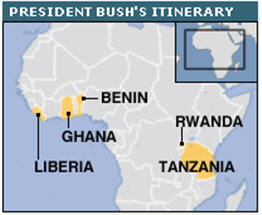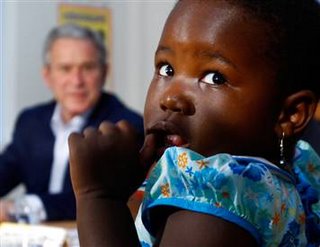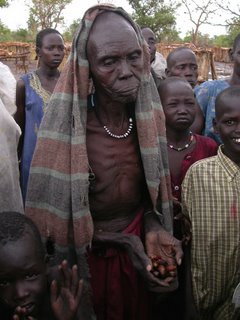To whom much is given, much is required. America has a moral obligation to help the suffering….
This is how President Bush explained his mission to combat HIV/AIDS, malaria, and poverty on the continent of Africa in an interview on NBC yesterday.
It is noteworthy, however, that he can distinguish his religious rhetoric in this respect from that of any other world leader, including his predecessor Bill Clinton. Because Bush has put American money (and lots of it) where his mouth is.
 Yet, even as some Africans are showering him with thanks and praises at every stop on his current tour, others are dismissing his mission as little more than a last-minute shopping spree to buy a presidential legacy. And no one expressed this cynicism – of unimpressed and ungrateful Africans – quite the way one man did in a BBC report on Bush’s trip:
Yet, even as some Africans are showering him with thanks and praises at every stop on his current tour, others are dismissing his mission as little more than a last-minute shopping spree to buy a presidential legacy. And no one expressed this cynicism – of unimpressed and ungrateful Africans – quite the way one man did in a BBC report on Bush’s trip:
Bush’s visit is belated and unnecessary as it comes at the twilight of his administration.
[Ashipa James Olashupo, Abuja, Nigeria]
Of course, there’s no denying that Bush is hoping his humanitarian legacy in Africa will offset, if not redeem, his warmongering legacy in Iraq. Nevertheless, his critics (especially spiteful, resentful, do-nothing Europeans) are wrong to suggest, as this African has, that he only found religion where Africa is concerned this year; i.e., the last of his presidency.
After all, since February 2005, I’ve been commenting on Bush’s African initiatives, which date back to his Millennium Challenge Account for African Development (in 2002) and his $15 billion Emergency Plan for AIDS Relief (2003).
 Indeed, the reason news reports indicate that he’s more popular in Africa than anywhere else is that millions of Africans have either benefited personally or witnessed the life-saving impact of his well-funded policies.
Indeed, the reason news reports indicate that he’s more popular in Africa than anywhere else is that millions of Africans have either benefited personally or witnessed the life-saving impact of his well-funded policies.
For example, five years ago, only 50,000 people were receiving medicine to treat HIV/AIDS. Today, more than 1.3 million are courtesy of Bush’s initiative. Not to mention the good news he brought about doubling US aid to $30 billion.
Still, his critics argue that juxtaposed to the $1 trillion he spent waging war in Iraq, this $30 billion is mere pittance. But this is a specious point, which actually betrays their Bush-can-do-no-right pathology.
After all, even with the albatross of Iraq around his neck, Bush made these unprecedented humanitarian commitments. By contrast, even as their countries enjoyed unprecedented levels of prosperity, no world leader has come close to matching his interest in and foreign aid to Africa.
I appreciate how incomprehensible it is that Bush’s financial and humanitarian aid to Africa might have almost as much influence in determining his presidential legacy as the war in Iraq….
Nevertheless, as one who has been pleading for decades for American presidents to back up their rhetoric about African development with more direct investments, I believe it’s imperative to give Bush his due. Accordingly, I feel constrained to end this
improbable paean to him by writing: “I told you so!”[“Bush has done more for Africa than any other US president,” The iPINIONS Journal, January 3, 2007]
 Meanwhile, apropos juxtaposition, not far from where Africans are hailing Bush as a savior, Arab militiamen are slaughtering other Africans in Darfur, Sudan. Even so, Bush has distinguished himself in this context as well. Because he was the first world leader to call this slaughter “genocide” in 2005.
Meanwhile, apropos juxtaposition, not far from where Africans are hailing Bush as a savior, Arab militiamen are slaughtering other Africans in Darfur, Sudan. Even so, Bush has distinguished himself in this context as well. Because he was the first world leader to call this slaughter “genocide” in 2005.
All the same, persistent indifference to the killing fields of Darfur troubled me so much that I sounded this alarm in May 2006:
Unless President Bush amasses a coalition more willing to intervene in Darfur than the coalition he amassed to invade Iraq, the casualties from this genocide will soon make what happened in Rwanda seem like an ordinary drive-by shooting in South Central, LA. And, it’s all happening with our eyes wide shut!
[“Save Darfur Rally: Full of sound and fury signifying nothing,” The iPINIONS Journal, May 2, 2006]
Alas, there’s only so much one man can do. Therefore, I suggest Olashupo and Bush’s other African detractors (like South African President Thabo Mbeki) direct their criticism inward at the failure of African leadership not only in Darfur, but also in Kenya, Zimbabwe, Nigeria, DR Congo….
Finally, much has been said, and justifiably so, about the double standards that govern US foreign policy. And that it has had diplomatic and trade relations with communist China and Russia while enforcing a 49-year embargo against Cuba stands as a glaring example in this respect.
By the same token, however, much can be said about the schizophrenia foreign governments present in their dealings with the US. And that African governments have lobbied Bush to intervene more aggressively in Darfur while rejecting even the notion of Africom (i.e., permanent US bases strategically located throughout the continent to promote peace and facilitate humanitarian aid) stands as a glaring example in this respect.
NOTE: I suspect “Kosovars” might take exception to reports that Bush is more popular today in Africa than he is in Kosovo. (See related articles for the reasons why….)
ENDNOTE: Given the mess he created in Iraq, I knew years ago that Bush would end up as a lame-duck president in search of a legacy. That’s why – in a January 2006 commentary (here) – I urged him to seal his legacy by lifting the embargo on Cuba.
In a similar vain, I admonished Cuban exiles – in an August 2006 commentary (here) and in a September 2007 one (here) – against false hopes that the end of Castro’s rule would spring forth a new era of democracy and a yearning for their return. And, in light of today’s wholly anticlimactic announcement of his resignation, it would be instructive to read (or re-read) both of them.
Related Articles:
Tribal warfare erupts in Kenya<
/span>
Save Darfur, but what about Zimbabwe
Conflict in DR Congo
Bush says ‘enough is enough. Kosovo is independent
Recognizing Kosovo independence
Bush African tour
Leave a Reply
You must be logged in to post a comment.